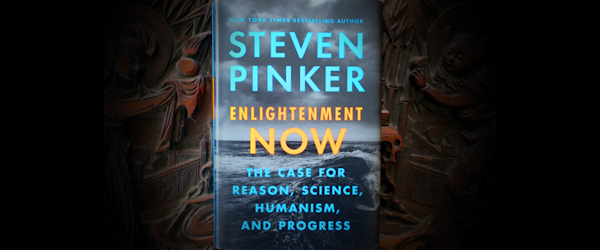
If your perception of the world is one built around the content of news, you probably have a negative feeling about the current state of affairs. News coverage has indeed become more negative over time. Fortunately, it is also true the world is not falling apart, but quite the contrary.
In his latest book “Enlightenment Now: The Case for Reason, Science, Humanism, and Progress,” Harvard cognitive scientist Steven Pinker presents a very compelling argument on how humanity today is living in the best time in history.
Following meticulously researched data on different development metrics throughout time, Pinker shows the incredible progress humanity has achieved and makes the case on why we must continue to defend the ideals of reason, science, and humanism, the pillars of the Enlightenment.
Some of the measurements of progress researched are prioritized on values the world agrees on including those in the United Nations Sustainable Development Goals.
When it comes to life span, the world has seen a sharp increase in the average life expectancy. While no developed country in the year 1800 had a life expectancy above 40, today the average life expectancy is 71.5 years globally. For countries in the developed world the average is more than 80 years. That is double the life expectancy in a period of 200 years!
With that, the rates of children and maternal mortality have plunged dramatically. And thanks to advances in farming, sanitation, medicine and science, people are also healthier today than ever before.
In terms of wealth and prosperity, Pinker shows in a very simple but powerful graphic how the Gross World Product today has grown almost 100 times since the Industrial Revolution. All countries have considerably increased their GDP while the percentage of people in extreme poverty has declined from 90% in the year 1800 to 10% today.
And yes, there is inequality. The author’s argument here could sound controversial to some as he mentions that inequality is not a fundamental component of well-being. Instead, he suggests focusing on poverty as a main concern, as “it is not about everyone having the same, but everyone having enough.”
Today, everyone in the US is better off thanks to globalization and technology. The author reveals how today “more than 95% of American households below the poverty line enjoy electricity, running water, flush toilets, a refrigerator, a stove, and a color TV. Affluent families like the Vanderbilts, Rothchilds, and others, had none of these things a century and a half before.”
But Pinker does acknowledge more needs to be done to reduce inequality and improve everyone’s standard of living, particularly the more economically vulnerable. He suggests a solution may be found in a universal basic income.
I appreciate his observations regarding the environment as I have been somewhat pessimistic and concerned about the future of humanity particularly on two topics: overpopulation and the depletion of our natural resources (mainly the water crisis).
As he shows, world population will continue to grow, but only temporary. Its growth rate peaked at 2.1% in 1962 and it has declined ever since, reaching 1.2% growth rate in 2010, and a close to zero projection for the year 2070, when the world population is expected to reach its maximum figure of about 9.4 billion people before it begins to decline.
The environment has seen promising progress as people continue to be more mindful about the importance of protecting our planet. Using clear graphs, Steven Pinker shows how the world has seen a decline in air pollution, deforestation, and oil spills, while the percentage of land and marine protected areas keep expanding.
Progress in technology and the digital revolution has pushed everywhere a rapid process of dematerialization which has allowed us to achieve more with less resources.
Alarming predictions of resource shortages have failed repeatedly, and humanity has always been able to find cheaper, better, and more plentiful substitutes, or recycle and re-engineer products for subsequent use.
When it comes to food production, farmers and scientists have discovered different methods which have allowed food to grow exponentially despite natural disasters and other crises. Our concern today has more to do with food waste rather than supply.
Regarding the topic of water, I wish the author had given the subject more coverage. In a brief remark, however, he believes there is no reason to be alarmed as water assurance will be achieved through desalinating seawater as the world continues to develop more carbon-free energy sources.
Despite the many improvements in environmental quality, the biggest challenge is facing the problem of human-made climate change. The effects of greenhouse gases on our planet’s climate have been increasing the average temperature with every recent year becoming the hottest on record.
The annual emissions of CO2 in the world increased almost every year since 1960. But thanks to strong global actions on decarbonization, CO2 emissions reached its peak in 2014, leveled in 2015, and has declined among the top three emitters (China, United States, and the European Union).
In the United States, carbon reduction has been accomplished by the growth of wind and solar energy, and by replacing bitumen coal with methane gas. In addition, and as distrusted as it is among the most passionate environmentalists, Pinker stresses we must support nuclear power, a carbon-free energy source and a key solution to further advance decarbonization.
The world is also more peaceful thanks in part to international trade, economic development, international law, and democracy around the world. Democratic Peace theory suggests countries that are more democratic are less likely to engage in a military conflict. Additionally, Pinker reminds us that war also became illegal with the founding of the United Nations in 1945.
On other topics I won’t expand (because I strongly recommend reading this book), the world is living its safest time in history, we are more democratic, more countries have taken big steps on equal rights, and people overall live a better quality of life.
All the above-mentioned criteria take us down to one of the most important indicators of human progress: happiness. People are happier when they are healthier, feel safer, have enough money, when they have the freedom to choose what to do with their lives, and when they spend quality time with friends and family, among other reasons. And data shows every newer generation seem to be happier than the previous one.
But what about the future of progress?
The ideals of the Enlightenment have contributed to improve human flourishing, and it must be an ongoing process. Pinker notes “progress is not utopia” and we must keep striving for human progress and fight counter-Enlightenment ideals that threaten the advancement of humanity.
Reason, science, and humanism are threatened today by the rise of authoritarian backward-looking populism in individuals in power like Trump, who has damaged the institutions of American democracy, attacked freedom of speech, promoted long-debunked conspiracy theories, threatened the environment, antagonized immigrants, and has been hostile to science, just to name a few of his autocratic actions.
More than ever, we need to keep defending reason, science, and humanism.
Pinker warns us that “politicization has become the major enemy of reason,” where people are making their own conclusions of what to believe based on their political bias and not on what is true.
To be clear, this happens with people in both right-wing and left-wing political ideologies. One of the best examples on the right is the denial of human-made climate change. And on the left, we have those denying the safety of vaccines and GMOs. Their positions completely ignore the scientific facts in defense of their (erroneous) beliefs.
To improve the standards of reasoning, we need effective training in critical thinking, cognitive debiasing, better discourse, and debate exercises. But the author also reveals a promising new strategy called adversarial collaboration, where opposite thinkers agree on a method and work together to reach a conclusion.
The accomplishments of science are vast. It has given us evidence-based medicine, it has explained many of the universe’s mysteries, how life evolved and how physical things work, among many other discoveries.
Despite this (or because of this), science has been attacked with hostility by groups that favor ignorance and superstition. The religious are particularly ticked off by science.
I have always found it silly when religious groups get mad at science for ruining their fairy tale stories. Instead of being mad at science for exposing the truth, they should be mad at whoever indoctrinated them with lies in the first place.
Positive for the advancement of reason and science is the fact that more and more people are realizing there is absolutely no good reason to believe in the existence of a God, and today the fastest-growing religion in the world is no religion at all. Amen!
Together with reason and science, Pinker stresses the importance of humanism to achieve progress and maximize human flourishing.
Humanism promotes the enrichment of life, health, happiness, freedom, knowledge, and love through the employment of secular values. Steven Pinker explains not only how the separation of church and state in the US Constitution originated from the necessity to consolidate the former British colonies, but also how diverse cultures have converged peacefully thanks to humanism.
A great example of a successful accomplishment among the world nations is the 1948 humanist manifesto known as the Universal Declaration of Human Rights.
There are many challenges to face, but many more reasons to be optimistic about the future of our planet. Steven Pinker’s book could not have come at a better time.
“Enlightenment Now” is uplifting and it has improved my perspective of the future of the world. It is also a call to understand, appreciate, and keep protecting the ideals of the Enlightenment that have made our lives better. I strongly recommend everyone to read his book.
 We become thinkers the very precise moment when we acknowledge death and discover our own mortality.
We become thinkers the very precise moment when we acknowledge death and discover our own mortality. “I’m beginning to see that our appetite for books is the same as our appetite for food, that our brain tells us when we need the literary equivalent of salads, chocolate, or meat and potatoes.” – Nick Hornby
“I’m beginning to see that our appetite for books is the same as our appetite for food, that our brain tells us when we need the literary equivalent of salads, chocolate, or meat and potatoes.” – Nick Hornby One of the biggest threats humanity faces today is the high probability of a jobless future, where robots and automation systems will take over all our jobs.
One of the biggest threats humanity faces today is the high probability of a jobless future, where robots and automation systems will take over all our jobs.